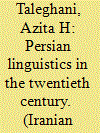| Srl | Item |
| 1 |
ID:
087493


|
|
|
|
|
| Publication |
2009.
|
| Summary/Abstract |
This article focuses on Persian linguistics with the emphasis on grammar and word formation in the twentieth century. After presenting a brief overview of the history of the study of grammar in Iran, I discuss the recent trends in linguistics from diachronic to synchronic aspects. In Persian diachronic linguistics, we will see that most works focus on the reading, and deciphering of the old texts. In synchronic studies, there are three main stages: 1) traditional linguistics, 2) structural linguistics, and 3) generative or formal linguistics. I show how each one of these stages affects Persian linguistics in the twentieth century. Finally, I conclude the article by looking at the current state of Persian linguistics and the future prospects for the field.
|
|
|
|
|
|
|
|
|
|
|
|
|
|
|
|
| 2 |
ID:
101022


|
|
|
|
|
| Publication |
2010.
|
| Summary/Abstract |
The present and past progressive tenses in Persian are the only tenses in which both the main verb and the minor verb dacircscarontan "to have" receive agreement marking. Morpho-syntactically, Persian progressives show the similar properties of both Aspectual Complex Predicates and Serial Verb Constructions. The question that this paper addresses is: are Persian progressive tenses Aspectual Complex Predicates or Serial Verb Constructions? By presenting the morpho-syntactic and semantic analysis of Persian progressives, and highlighting the main properties of Aspectual Complex Predicates and Serial Verb Constructions, the paper shows that, despite the similarities between these verbal constructions and Aspectual Complex Predicates, Persian progressives are instances of Serial Verb Constructions where neither a complementizer nor a conjunction separates the two verbs and the complex describes a single conceptual event.
|
|
|
|
|
|
|
|
|
|
|
|
|
|
|
|